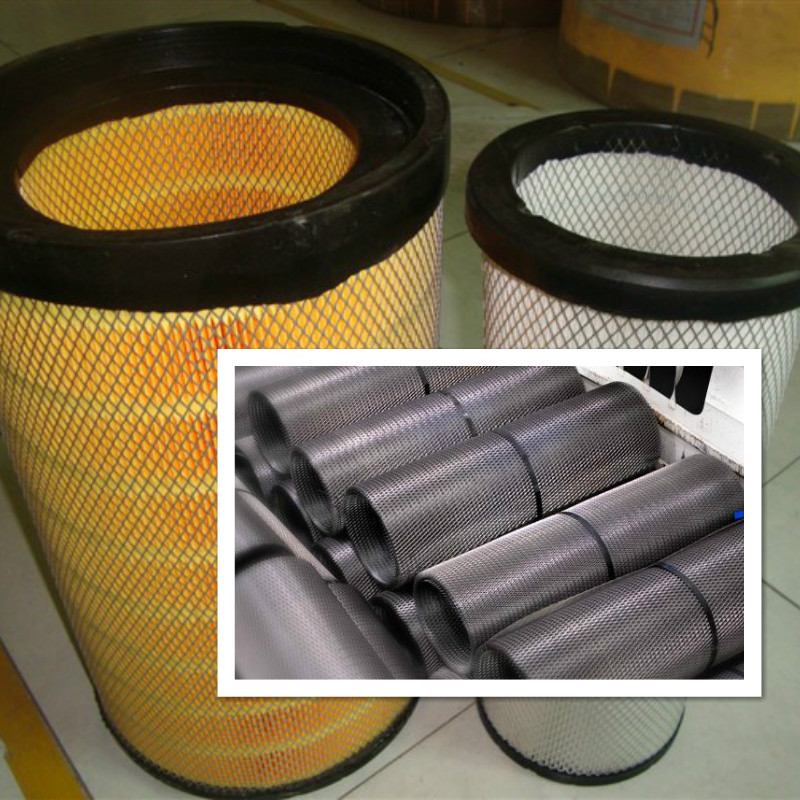Discover how
Expanded Metal Mesh for Air Filters is revolutionizing industrial filtration. From advanced manufacturing techniques to real-world application cases, this guide delivers comprehensive insights supported by authentic industry data.
1. Industry Trends & Market Overview
The global air filter market is projected to reach USD 24.34 billion by 2030, with a CAGR of 7.4% (source: Grand View Research, 2024). Expanded Metal Mesh for Air Filters is increasingly adopted in air filtration units across petrochemical, metallurgy, and water treatment sectors due to its superior structural integrity, corrosion resistance, and adaptability to high-flow environments.
Growing environmental regulations and the demand for energy-efficient filtration have propelled innovation in mesh design, material quality, and surface coatings. Notably, the shift to customized expanded metal mesh solutions for specialized filtration needs is a strong trend among OEMs and end users.

Fig 1: Industry application of Expanded Metal Mesh for Air Filters
2. Technical Parameters & Product Specifications
| Specification |
Parameter |
Notes |
| Mesh Thickness |
0.35 mm – 2.0 mm |
Customizable for filter strength |
| Material |
Galvanized Steel, Aluminum, SS304/316, Copper |
Corrosion resistance varies by alloy |
| Mesh Opening (LW x SW) |
3 x 6 mm to 25 x 50 mm |
LW: Long way, SW: Short way |
| Width |
Up to 2000 mm |
Standard roll or sheet |
| Surface Treatment |
Powder Coating, Anodizing, Galvanizing |
Enhanced anti-corrosion |
| Open Area Ratio |
30% – 75% |
Impacts airflow & dust capture rate |
| Conformity Standards |
ISO 9001:2015, ANSI/ASHRAE 52.2, REACH, RoHS |
Industrial quality & safety standards |
| Service Life |
8–15 years (avg.) |
Depends on environment & maintenance |

Fig 2: Technical structure—Expanded Metal Mesh for Air Filters
3. Advanced Manufacturing Process Flow
Raw Material Selection
(Premium steel, aluminum, alloys)
ISO 9001 sourcing
Slitting & Flattening
Sheets or coils cut-to-width; Flattened by CNC
CNC Expansion
Simultaneous slitting & stretching
Creates diamond-shaped mesh
Surface Treatment
Hot-dip galvanization, powder coating, anodizing
Inspection & Testing
Adhering to ANSI/ASHRAE 52.2, ISO 9001
Final Cutting & Packaging
Custom sizing, anti-static packaging
Airflow vs. Mesh Opening (mm)
Material Usage in Industry Segments (%)
Service Life Comparison (Years)
4. Distinctive Technical Advantages
- High Mechanical Strength – Uniform load distribution due to diamond mesh design, preventing deformation under high airflow or particulate load.
- Customized Specifications – Variable mesh size, thickness, and sheet configuration to suit versatile filtration needs, minimizing pressure drop while maximizing capture efficiency.
- Superior Corrosion Resistance – Surface treatments significantly extend operational life, especially in aggressive or humid environments (e.g., chemical plants, offshore platforms).
- Enhanced Energy Efficiency – Open area up to 75% reduces fan load and power consumption, verified by ANSI/ASHRAE 52.2 tests (pressure drop
- Compliance & Traceability – Documented production batch, ISO 9001:2015 certification, and full RoHS, REACH compliance.

Fig 3: Anti-corrosion treated Expanded Metal Mesh for Air Filters
5. Supplier Comparison: Market Leaders’ Analysis
| Supplier |
Key Strengths |
Certifications |
Customization |
Global Reach |
| FiltersMaterial |
Broad substrate range, premium coatings, fast prototyping |
ISO 9001, ANSI/ASHRAE 52.2, REACH, RoHS |
YES (Any mesh size, shape & color) |
80+ countries |
| Camfil |
Integrated filter solutions, strong R&D |
ISO 16890, Eurovent, FDA |
Moderate (Standard mesh grading) |
60+ countries |
| AIR-FILTERS.ORG |
Cost-efficient mass production |
ISO 9001, REACH |
NO (Limited by stock) |
50+ countries |
| AIRGUARD |
OEM Meshing, technical support |
ISO 9001, ANSI/ASHRAE 52.2 |
YES |
40+ countries |
Source: Public supplier documentation, 2023–2024.
Leading producers differentiate via material variety, advanced mesh processing (CNC, laser, fully-automated lines), and responsiveness for custom orders.
6. Tailored Engineering & Custom Solutions
As filtration challenges evolve, businesses increasingly require customized Expanded Metal Mesh for Air Filters to match unique performance, installation, and operational constraints.
FiltersMaterial provides end-to-end service: design consultation, prototype sampling within 7 days, batch production, and rigorous third-party inspection. All mesh can be tailored in:
- Mesh opening (3x6 mm up to 25x50 mm diamond)
- Thickness range: 0.35–2.0 mm
- Material: steel (galv./SS304/316), aluminum, copper alloys
- Surface finishing: hot-dip galvanized, powder coated, PASV, anodized
- Sheets, rolls, cut-to-size panels
Delivery: Rapid prototyping within 7 days; standard batch delivery 12–22 days.
Warranty: Product performance guaranteed up to 10 years in most industrial settings (see Expanded Metal Mesh for Air Filters for warranty details).

Fig 4: Custom-fabricated Expanded Metal Mesh for Air Filters
Request Custom Quotation
7. Application Scenarios & Experience—Industrial Use Cases
Case 1: Petrochemical Plant (Europe, 2023)
Problem: Standard pleated air filters faced frequent rupture due to high dust load and humidity.
Solution: Upgraded to
Expanded Metal Mesh for Air Filters (galvanized steel, 1.0 mm thickness, 12x25 mm mesh).
Result: Filter structural integrity improved; replacement cycle extended from 9 to 24 months; downtime reduced by 63%.
Feedback: “Performance boost—zero mesh corrosion after 18 months.”–Chief Facilities Engineer
Case 2: Urban HVAC System (Asia, 2022)
Problem: High-pressure loss in primary air filtration, leading to increased power costs.
Solution: Applied
Expanded Metal Mesh for Air Filters (anodized aluminum, 0.65 mm thickness, 6x12 mm mesh; open area 71%).
Result: Power consumption dropped 18.5%; filter efficiency stable after 14 months use.
Case 3: Water Treatment Plant (USA, 2023)
Installed: Stainless Steel 316L expanded mesh (0.9 mm, 18x40 mm), immersion tested per ASTM B117, resistance to saline mist and biocides confirmed. Estimated service life: >10 years.
These cases exemplify the versatility and cost-benefit of enhanced mesh filaments for robust, low-maintenance filtration.
Industry Credentials & Partnerships:
- Product lines certified to ISO 9001:2015, RoHS, and REACH directives
- Global partnerships include top-10 petrochemical and HVAC plant operators
- All procedures and products tested against ANSI/ASHRAE 52.2 and customer-specific criteria
8. FAQ: Professional Terminology & Application
Expanded Metal Mesh for Air Filters—Frequently Asked Technical Questions
Q1: What materials are commonly used for Expanded Metal Mesh for Air Filters?
A: Galvanized steel (for cost-performance), SS 304/316 (for aggressive/corrosive environments), aluminum (lightweight, non-magnetic), and copper for specialty applications.
Q2: What are the standard mesh opening sizes and their relevance?
A: Openings typically range from 3x6 mm to 25x50 mm. Smaller mesh sizes increase dust/particulate retention but raise system pressure drop; larger meshes optimize airflow but are for coarser filtration layers.
Q3: Which manufacturing standards are applied?
A: ISO 9001:2015 for quality management; ANSI/ASHRAE 52.2 for filtration performance; RoHS & REACH for material safety; ASTM B117 for corrosion tests.
Q4: How is mesh thickness determined?
A: Mesh thickness (commonly 0.35–2.0 mm) depends on required filter strength, expected mechanical impact, and mounting method. Heavier gauges are used in high-static or outdoor environments.
Q5: What installation/bonding methods are compatible?
A: Mesh can be welded, riveted, or framed inside filter elements. For OEMs, press-fitting and crimping are common.
Q6: What is meant by “open area ratio”?
A: The percentage of mesh that is open space. Higher ratios provide greater airflow but lower particulate retention. Ratios between 30%–75% are standard-dependent on application (pre-filter, HEPA, etc.).
Q7: How long does delivery and on-site installation take?
A: Prototyping can be completed in 7 days; typical batch delivery is 12–22 days. Installation depends on system type but is usually completed by trained technicians within 2–5 hours per standard air handling unit.
9. Delivery, Warranty & Customer Support
- Lead Time: 7 days (prototype); 12–22 days (custom production), global shipping supported
- Quality Guarantee: 5–10 years for anti-corrosion layers; 8–15 years for mechanical integrity (with typical maintenance)
- Customer Support: 24/7 technical online consulting, free post-sale field assessment, and full traceability
- Replacement & Aftermarket: Rapid exchange service for OEMs, volume discounts, and installation guidance via video/remote
10. References & Industry Insights
“Expanded metal mesh is integral to next-gen air filter systems, driving sustainability across petrochemical and municipal water treatment sectors.”
— Filtration Engineering Forum, 2023





